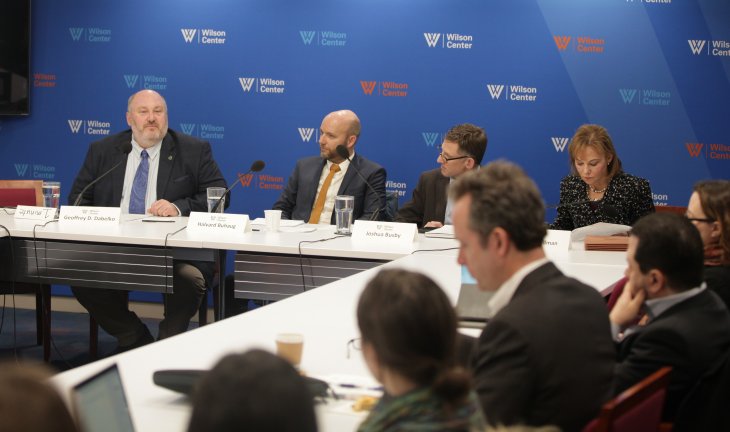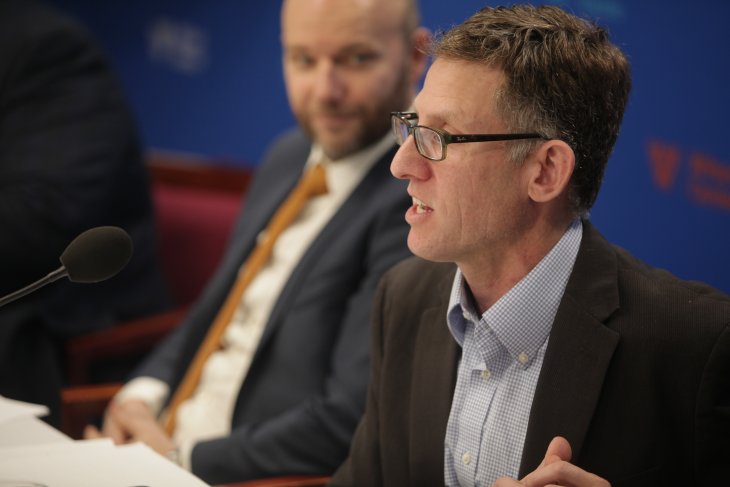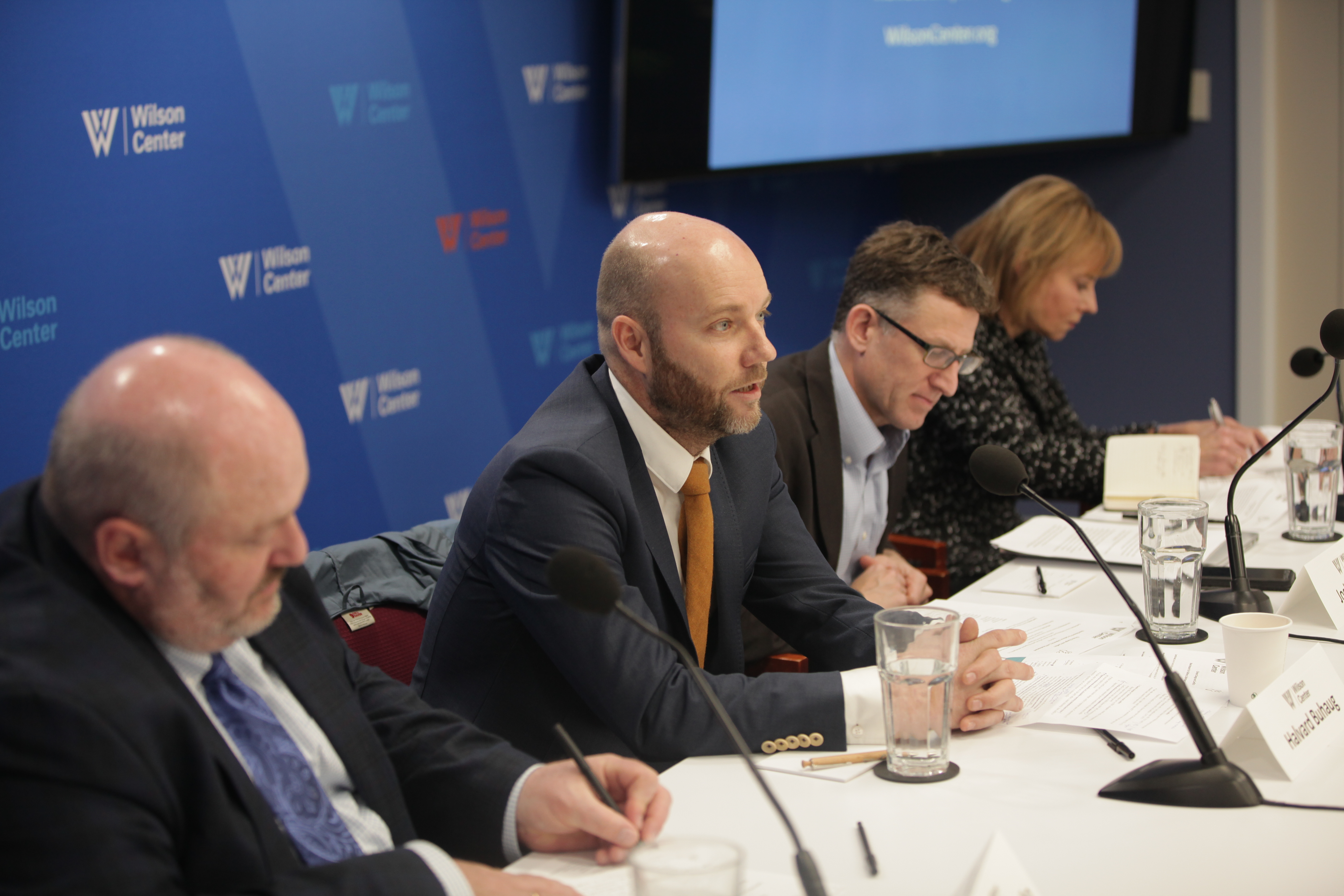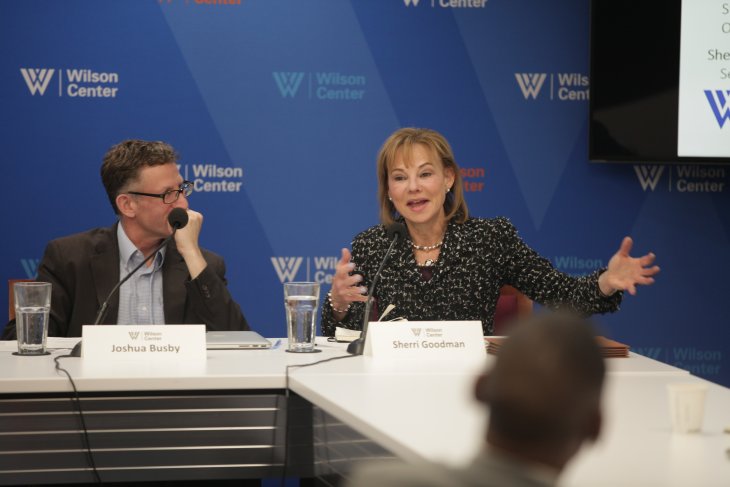Last week, PRIO co-hosted a set of meetings for peers, policy, and the general public at the Woodrow Wilson International Center for Scholars in Washington, DC.
These events marked the end of Climate Anomalies and Violent Environments (CAVE), a three-year research project supported by the Research Council of Norway’s FRIPRO program. The project has contributed with important insights into how climate variability affects dynamics of political violence through a large body of publications, reports, and working papers. At the events in Washington DC, these findings were communicated and discussed with other scholars, practitioners, and policy actors.

Scholars, practitioners, policy actors and the public met to discuss the state-of-the-art on climate and security. PHOTO: Wilson Center/Flickr
The main event was a public seminar on “Climate Change and Conflict: New Research for Defense, Diplomacy, and Development” with particular focus on the current state-of-the-art on climate and security and how scientific evidence can be implemented in politics and practice. Three panelists introduced their take on this issue: Joshua Busby, Associate Professor of Public Affairs at the University of Texas, Austin; Sherri Goodman, Senior Fellow at the Wilson Center and former US Deputy Under-Secretary of Defense; and Halvard Buhaug, Research Professor at PRIO and project leader of the sponsoring CAVE project. Under the moderation of Geoff Dabelko, former director of the Environmental Change and Security Program at the Wilson Center and Professor of Environmental Studies at Ohio University, questions from the audience paved the way for a engaging and insightful discussion.
The public seminar can be watched in full by following this link, but to save you some time, here are some of the key take-away messages:
- Climate variability and change appear inextricably linked to conflict, but to what extent does this reflect a causal relationship? As explained by Buhaug, violent conflict is a fundamental driver of climate vulnerability but the role of climatic changes in driving conflict is less well understood. Emerging evidence indicates that climatic changes may affect conflict dynamics, such as duration and severity of hostilities, but there is much less scientific evidence that adverse environmental changes are a major and immediate cause of armed conflict outbreak.
- The security dimension of climate change extends well beyond civil conflict. As argued by Busby, scholars should widen their scientific scope and include, for example, non-violent conflict events in their analyses to better understand the full range of possible human security impacts.
- The cautious and sometimes conflicting findings of current research on climate and conflict can make it hard to design efficient policies. This point was emphasized by Goodman, who is familiar with the challenges of translating research ideas into clear and actionable recommendations for military officials and policy makers through her past work at the US Department of Defense.
- Among the many interesting questions that were posed by the audience, one problematized the seeming conflict between research and policies in a world that is rapidly changing and requiring rapid action. Put very simply, what is the right balance between being scientifically correct and doing something? The panelists all agreed that striking this balance is inherently complex and a continuous challenge, and that there is no blanket solution that fits all situations.
- Although Buhaug reminded us that insights from extant research imply that caution should be exercised when concluding on the conflict potential of climate change, we can still identify no-nonsense policies that we know will carry beneficial consequences for human security, such as development aid and assistance programs aimed at the most marginalized and vulnerable communities. Along the same lines, Goodman emphasized that a holistic solution is key when designing the right policies, whereas Busby ended on a note that future research needs to invest more in tracing indirect pathways and mechanisms to better understand why societies exposed to similar physical stresses may have widely different responses.
In addition to the public seminar, the Wilson Center and PRIO also co-hosted a private policy and practice meeting, as well as a scientific workshop aimed at identifying promising pathways for future research on climate change and security.
In the coming weeks, we will post some of the specific contributions to the Wilson Center events as separate blog posts – stay tuned!
You can also read the Wilson Center’s own blog post from the event here.

The panel discussion highlighted some of the main challenges for the research community and actors in the policy arena. Joshua Busby argued that the security dimension of climate change extends well beyond civil conflict. PHOTO: Wilson Center/Flickr

The event was initiated by Halvard Buhaug, who has led a three-year research project at PRIO on the consequences of climate change on violence. PHOTO: Wilson Center/Flickr

Sherri Goodman represented the practitioners’ perspective, and shared valuable insights from her experience when working with the US Department of Defense. PHOTO: Wilson Center/Flickr
[…] the relationship between climate change and security? I recently attended a Woodrow Wilson Center event organized by the Peace Research Institute Oslo (PRIO) on the state of the field. Along with Geoff […]